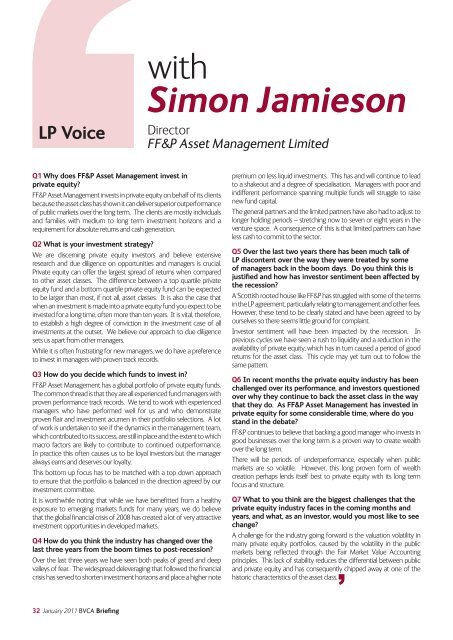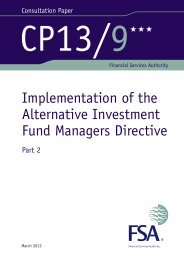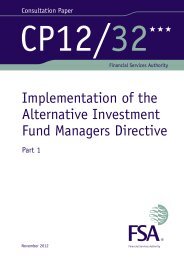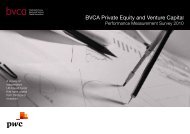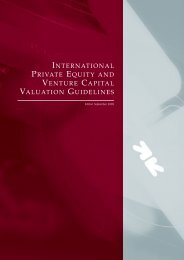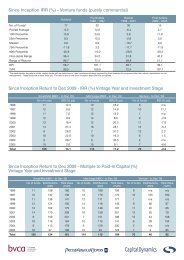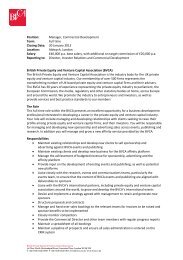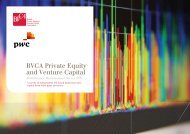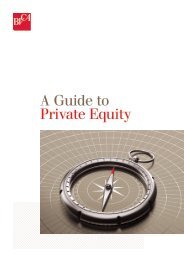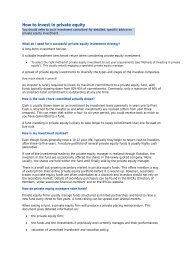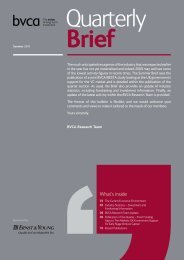fundraising special - BVCA admin
fundraising special - BVCA admin
fundraising special - BVCA admin
Create successful ePaper yourself
Turn your PDF publications into a flip-book with our unique Google optimized e-Paper software.
LP Voice<br />
Q1 Why does ff&P Asset Management invest in<br />
private equity?<br />
FF&P Asset Management invests in private equity on behalf of its clients<br />
because the asset class has shown it can deliver superior outperformance<br />
of public markets over the long term. The clients are mostly individuals<br />
and families with medium to long term investment horizons and a<br />
requirement for absolute returns and cash generation.<br />
Q2 What is your investment strategy?<br />
We are discerning private equity investors and believe extensive<br />
research and due diligence on opportunities and managers is crucial.<br />
Private equity can offer the largest spread of returns when compared<br />
to other asset classes. The difference between a top quartile private<br />
equity fund and a bottom quartile private equity fund can be expected<br />
to be larger than most, if not all, asset classes. It is also the case that<br />
when an investment is made into a private equity fund you expect to be<br />
invested for a long time, often more than ten years. It is vital, therefore,<br />
to establish a high degree of conviction in the investment case of all<br />
investments at the outset. We believe our approach to due diligence<br />
sets us apart from other managers.<br />
While it is often frustrating for new managers, we do have a preference<br />
to invest in managers with proven track records.<br />
Q3 How do you decide which funds to invest in?<br />
FF&P Asset Management has a global portfolio of private equity funds.<br />
The common thread is that they are all experienced fund managers with<br />
proven performance track records. We tend to work with experienced<br />
managers who have performed well for us and who demonstrate<br />
proven flair and investment acumen in their portfolio selections. A lot<br />
of work is undertaken to see if the dynamics in the management team,<br />
which contributed to its success, are still in place and the extent to which<br />
macro factors are likely to contribute to continued outperformance.<br />
In practice this often causes us to be loyal investors but the manager<br />
always earns and deserves our loyalty.<br />
This bottom up focus has to be matched with a top down approach<br />
to ensure that the portfolio is balanced in the direction agreed by our<br />
investment committee.<br />
It is worthwhile noting that while we have benefitted from a healthy<br />
exposure to emerging markets funds for many years, we do believe<br />
that the global financial crisis of 2008 has created a lot of very attractive<br />
investment opportunities in developed markets.<br />
Q4 How do you think the industry has changed over the<br />
last three years from the boom times to post-recession?<br />
Over the last three years we have seen both peaks of greed and deep<br />
valleys of fear. The widespread deleveraging that followed the financial<br />
crisis has served to shorten investment horizons and place a higher note<br />
32 January 2011 <strong>BVCA</strong> Briefing<br />
with<br />
Simon Jamieson<br />
Director<br />
ff&P Asset Management Limited<br />
premium on less liquid investments. This has and will continue to lead<br />
to a shakeout and a degree of <strong>special</strong>isation. Managers with poor and<br />
indifferent performance spanning multiple funds will struggle to raise<br />
new fund capital.<br />
The general partners and the limited partners have also had to adjust to<br />
longer holding periods – stretching now to seven or eight years in the<br />
venture space. A consequence of this is that limited partners can have<br />
less cash to commit to the sector.<br />
Q5 Over the last two years there has been much talk of<br />
LP discontent over the way they were treated by some<br />
of managers back in the boom days. Do you think this is<br />
justified and how has investor sentiment been affected by<br />
the recession?<br />
A Scottish rooted house like FF&P has struggled with some of the terms<br />
in the LP agreement, particularly relating to management and other fees.<br />
However, these tend to be clearly stated and have been agreed to by<br />
ourselves so there seems little ground for complaint.<br />
Investor sentiment will have been impacted by the recession. In<br />
previous cycles we have seen a rush to liquidity and a reduction in the<br />
availability of private equity, which has in turn caused a period of good<br />
returns for the asset class. This cycle may yet turn out to follow the<br />
same pattern.<br />
Q6 in recent months the private equity industry has been<br />
challenged over its performance, and investors questioned<br />
over why they continue to back the asset class in the way<br />
that they do. As ff&P Asset Management has invested in<br />
private equity for some considerable time, where do you<br />
stand in the debate?<br />
FF&P continues to believe that backing a good manager who invests in<br />
good businesses over the long term is a proven way to create wealth<br />
over the long term.<br />
There will be periods of underperformance, e<strong>special</strong>ly when public<br />
markets are so volatile. However, this long proven form of wealth<br />
creation perhaps lends itself best to private equity with its long term<br />
focus and structure.<br />
Q7 What to you think are the biggest challenges that the<br />
private equity industry faces in the coming months and<br />
years, and what, as an investor, would you most like to see<br />
change?<br />
A challenge for the industry going forward is the valuation volatility in<br />
many private equity portfolios, caused by the volatility in the public<br />
markets being reflected through the Fair Market Value Accounting<br />
principles. This lack of stability reduces the differential between public<br />
and private equity and has consequently chipped away at one of the<br />
historic characteristics of the asset class.


